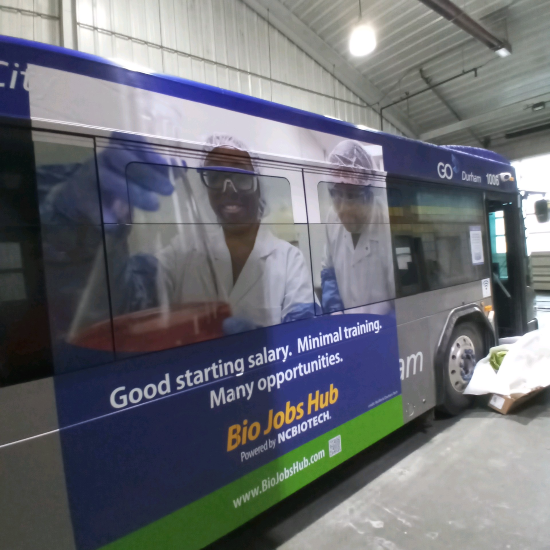RESEARCH TRIANGLE PARK – This might be a good time to take note.
The fast evolution of the early 2020 COVID-19 outbreak into the shockingly deadly and global pandemic sparked an equally amazing response from all quarters of North Carolina’s diverse life sciences community.
Academic and commercial scientists across the state embraced the cause, diverting funds, facilities, and expertise to a wide range of tasks aimed at limiting the SARS-CoV-2 virus and its effects on humans. The North Carolina Biotechnology Center has highlighted many of those activities in a special section of its website.
In fact, NCBiotech has been active from the outset of this pandemic in educating, supporting ideas, and coordinating this effort. One key example:
In March 2020, NCBiotech’s Science and Technology Development (SciTech) team pivoted in real time to respond to a multitude of challenges posed by the pandemic. One example can be seen from the Center’s appropriately titled, though pre-existing, grant funding program targeting academic researchers: Flash Grants.
A Flash in the pandemic
The five-person SciTech group repositioned a series of upcoming Flash Grant cycles. They decided to solicit proposals from the state’s academic investigators and other inventors seeking to develop new COVID-relevant therapeutics, vaccines and adjuvants, diagnostics, and other testing methodologies, “and related innovations.”
The announcement of the first grant cycle, with a tight deadline of April 22, 2020, sought proposals targeting COVID-19 vaccine development, diagnosis, and COVID-19-specific therapies. That RFP resulted in 21 proposals from academic researchers across the state. Of those, 12 received awards at seven different universities, totaling $238,865. They included work on diagnostics, therapeutics, new vaccine formulations, repurposing existing vaccines and development of AI and data systems for improved prediction and tracking.
The second cycle, with a deadline of August 12, 2020, called for COVID-19-specific therapies, vaccine development, diagnosis, and epidemiology. It brought 13 proposals, seven of which were awarded Flash Grants at five universities, totaling $139,108. They included work on new therapeutics, delivery mechanisms and vaccines.
The other cycle sought to narrow proposals from investigators studying SARS-CoV-2 gastrointestinal effects and those pursuing SARS-CoV-2 detection via wastewater. Those topics resulted in seven proposals and $36,450 in total awards to two investigators, each working on the wastewater question at different universities.
Bottom line: NCBiotech garnered 41 COVID-19-related Flash Grant requests and awarded $414,423 to the 21 proposals deemed the most compelling.
Targeting employment needs too
The NCBiotech SciTech team also manages a multi-million-dollar Gene Therapy Fellowship program funded by Pfizer. One of the Fellows is working on a project under renowned coronavirus researcher Ralph Baric at the University of North Carolina at Chapel Hill. It wasn’t a Flash Grant. But the grant review team was prescient. They made this selection mere months before the global COVID-19 outbreak.

NCBiotech also responded quickly to the shutdown of university research labs caused by the pandemic, issuing automatic no-cost extensions to awardees’ grant limits and maintaining the salaries of the Pfizer fellows while they were unable to conduct their research.
NCBiotech also quickly developed a public awareness program to introduce people left jobless from the pandemic to new possibilities in the state’s huge and growing biomanufacturing sector. People everywhere in the arts, in hospitality, in transportation, in entertainment, were losing their jobs in droves. So NCBiotech is now showing North Carolinians, including people completing military service, their spouses, and veterans, how to find a rewarding future in the state’s biomanufacturing workforce, via a new resource called the Bio Jobs Hub.
All that activity is still unfolding as grant recipients develop their findings and job seekers attend virtual informational events and start making decisions in individual career pathways.
And it spotlights the Biotech Center’s constant ability to react to fast-changing challenges and opportunities to maintain North Carolina’s position as a global life sciences leader.
(C) N.C. Biotech Center





























